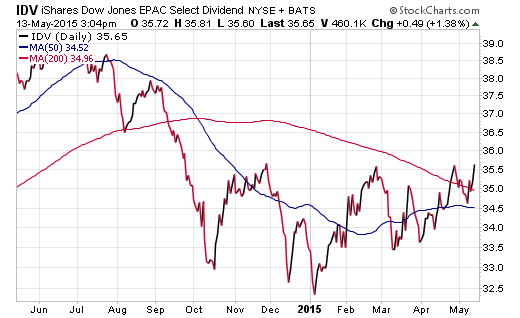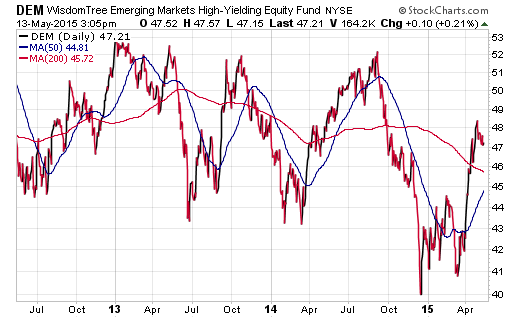Income investors have known this day would come eventually – just as you shift all of your focus to U.S.-based markets where the momentum was strongest, the tide turns to overseas strength. Emerging markets in particular have been a well-documented story of “great fundamental theme, awful price action”.
Nevertheless, the tide has turned this year on many dividend paying stocks in emerging market countries, which makes it a perfect time to review your existing international positions to determine if changes are needed.
As a relative benchmark, the iShares International Select Dividend ETF (NYSE:IDV) can provide us with some perspective on the concept of high quality foreign companies with consistently high yields. IDV owns 100 stocks of primarily developed markets such as Australia, United Kingdom and France. This ETF also sports a trailing 12-month dividend yield of 4.95%.
Since the beginning of the year, IDV has gained 6.5% and recently broke out to new year-to-date highs. This fund is now also back above its 50- and 200-day moving averages, which is a strong technical sign.

The performance in IDV is easily stronger than a U.S. equivalent, the iShares Core High Dividend ETF (NYSE:HDV), which has gained just 1% this year. However, the real momentum in equity income funds has cropped up in an unlikely place this year.
The WisdomTree Emerging Markets Equity Income Fund (ARCA:DEM) is the largest ETF dedicated to dividend paying stocks in burgeoning economies such as China, Russia, and Taiwan. This fund has over $2.4 billion in total assets allocated to 300 emerging market companies with the highest yields. The holdings in DEM are dividend weighted according to annual cash payments made by each stock.
The returns in DEM have been anything but stellar over the last several years. According to fund company data, this ETF has average annualized gains of just 1.26% over the last 5 years and -4.40% over the last 3 years (through 3/31/15).
Despite that dismal track record, DEM has jumped out of the gate with a gain of 12% so far in 2015 amid strong leadership in Asia and Eastern Europe. This recent momentum is commendable, but also brings about the question of staying power. We have seen many such rallies in emerging market dividend stocks over the last three years that have ultimately fizzled.

It’s unknown if this time will be different and if high yield emerging market stocks will be able to break out of their sideways malaise. A convincing break above the $52 resistance level would be a positive sign that things are on the right track and a new sustainable uptrend is forming. Being early to that possibility will provide greater reward, but also higher chances of a false breakout that ultimately reverses course.
For those that are more conservative with their emerging market exposure, staying with a broad-based international dividend play may be better suited to your tastes. IDV is the path that we have chosen for clients in our Strategic Income portfolio as a small allocation to high yield stocks overseas. Another fund that I favor is the SPDR S&P International Dividend ETF (NYSE:DWX).
DWX has greater overall exposure to emerging markets than IDV, although it is capped within the index at 15%. It also has much more of its portfolio in energy stocks through a larger allocation to Canadian equities. A resurgence in the energy sector would likely cause DWX to outperform its peers.
The Bottom Line
International dividend ETFs can be an attractive option to boost the yield of your portfolio alongside instant diversification in the global marketplace. Emerging market dividend ETFs offer a high risk, high reward proposition that may ultimately prove to be a successful bet for aggressive income seekers looking to catch the turn.
When selecting a region or asset allocation that makes sense for your goals, it’s always smart to start with small allocations that you can add to over time. This will allow you to take the opportunity to average into an attractive cost basis or provide more flexibility to cut bait if the trend falls out of favor.
Disclosure: FMD Capital Management, its executives, and/or its clients may hold positions in the ETFs, mutual funds or any investment asset mentioned in this article. The commentary does not constitute individualized investment advice. The opinions offered herein are not personalized recommendations to buy, sell or hold securities.
Original Post
